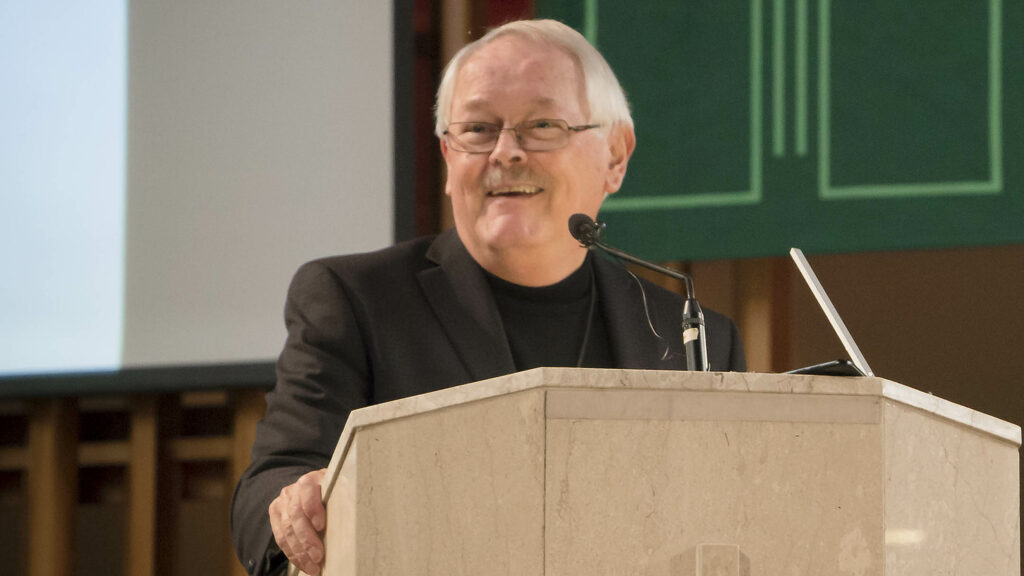In his book The Secret, Rene Fumoleau has a poem entitled Sins. Fumoleau, who was a missionary priest with the Dené People in Northern Canada, once asked a group of Elders to name what they considered the worst sin of all. Their answer:
The ten Dené discussed together,
And after a while Radisca explained to me:
“We talked it over, and we all agree:
The worst sin people can make
is to lock their door.”
Perhaps at the time this incident took place and in that particular Dené village, you could still safely leave your door unlocked, but that’s hardly sound advice for most of us who are safe only when we have double locks and electronic security systems securing our doors. Still these Dené Elders are right because at the end of the day, they’re speaking of something deeper than a security bolt on our outside door. What does it really mean to lock your door?
As we know, there are many kinds of doors we lock and unlock to let others in and out. Jean-Paul Sartre, the famed French existentialist, once wrote: Hell is the other person. While this may feel very true emotionally on a given day, it is the antithesis of any religious truth, particularly Christian truth. In all the great religions of the world, in the end being with others is heaven; ending up eternally alone is hell.
That’s a truth built into our very nature. As human persons we are constitutively social; meaning we’re built in such a way that while we’re always individual, private, and idiosyncratic at the same time we’re always social, communitarian, and interdependent. We’re built to be with others and there’s no ultimate meaning or fulfillment to be found alone. Indeed, we need each other simply to survive and remain sane. Still more, we need each other for love and meaning because without these there’s no purpose to us. To end up alone is death of the worst kind.
This needs to be highlighted today because both in society and in our churches too many of us are locking a select number of our doors in ways that are both destructive and genuinely unchristian. What’s our issue?
Twenty years ago, Robert Putnam looked at the breakdown of community within our culture and named it with a catchy phrase, Bowling Alone. For Putnam, our families, neighborhoods, and wider communities are breaking down because of an excessive individualism within the culture. More and more, we’re doing things alone, walking within our own idiosyncratic rhythms rather than within community rhythms. Few would dispute this assessment.
However, what we’re struggling with today goes further than the individualism Putnam so playfully names. In the excessive individualism Putnam describes, we end up bowling alone but mostly still inside the same bowling alley, separate from each other but not locked out. Our problem goes deeper. Metaphorically, we’re locking each other out of our common bowling alley. What’s meant here?
Beyond an isolating individualism, we’re struggling today in our families, communities, countries, and churches with a demon of a different sort, that is, with doors locked in bitterness. Politically, in many of our countries we’re now so polarized that the various sides are unable to even have a respectful, civil conversation with each other. The other is “hell”. This is true too inside our families where conversation at the Thanksgiving or Christmas dinner has to carefully avoid all references to what’s going on in the country and we can only be at the same table with each other if we keep our political views locked away.
Sadly, this is now mirrored in our churches where different visions of theology, ecclesiology, and morality have led to a polarization of such intensity that each theological and ecclesial group now stays behind its own solidly locked door. There’s no openness to what’s other and all real dialogue has been replaced by mutual demonization. This lack of openness is ultimately what the Dene refer to as the worst sin of all, our locked doors. Hell then really is the other person. Sartre must be smiling.
It’s interesting how evil works. The Gospels give us two separate words for the evil one. Sometimes the evil one is called “the devil” (Diabolos) and sometimes the evil one is called “satan” (Satanas). Both describe the evil power that works against God, goodness, and love within a community. The “Devil” works by dividing us, one from another, breaking down community through jealousy, pride, and false freedom; whereas “Satan” works in the reverse way. Satan unites us in sick ways so as to have us, as groups, demonize each other, carry out crucifixions, and cling to each other feverishly through sick kinds of hysteria and ideologies that make for scapegoating, racism, sexism, and group-hatred of every kind. Either way, whether it’s satan or the devil, we end up behind locked doors where those outside of ourselves are seen as hell.
So it’s true, “the worst sin we can make is to lock our doors.”

